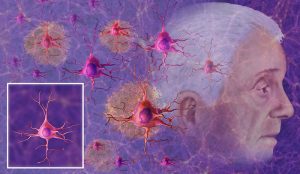Neurodegenerative diseases affect millions of Americans, especially those who are elderly or approaching old age. These diseases can cause rapid decline and loss of both one’s well-being and one’s ability to care for oneself. Although there are several treatments that can improve or extend the lives of people living with neurodegenerative disease, there currently are no cures. As a result, most treatments are focused on slowing disease progression and improving quality of life in the meantime. New studies have found that restricting eating times may be an effective way to improve quality of life for those who suffer from these diseases.
Living With Neurodegenerative Disease
Neurodegenerative diseases are, by definition, diseases that include a progressive loss of brain function. This group of disease includes diseases such as Alzheimer’s disease, Parkinson’s disease, multiple sclerosis and Amyotrophic Lateral Sclerosis (ALS). Although the pathophysiology of these diseases can differ, they all share a few core characteristics. People with these diseases gradually lose cognition, memory, and the ability to care for themselves, causing a sharp decline in quality of life. Many people are left unable to work, perform hobbies, perform personal activities of daily living and keep a healthy social life.

Restricting Eating Times: Good for the Brain?
To evaluate the effects of time-restricted eating on symptoms of neurodegenerative disease, researchers studied the symptoms of rats with Huntington disease who were subjected to different diets. Half of the rats had a constant food supply while the other half were given the same amount of food but limited to the same six hours every day. Their diets were otherwise identical.
Interestingly, the rats who only were allowed to eat for six hours a day saw a marked improvement in their quality of life over the control group. They had better motor skills, better sleep quality, and were able to maintain a more typical routine compared to the rats who ate freely. In addition to changes in activity, the rats who restricted meal times showed different gene activity. They had healthier gene expression in the striatum, the area of the brain that governs motor control and is harmed in Huntington disease. This is just one study, but it suggests that a simple change in when we eat could slow the rate of brain degeneration in some neurodegenerative diseases.
Health Benefits of Time-Restricted Eating
This is hardly the first study to find benefits for people and animals who restrict their eating times. People who have restricted eating times are less likely to be obese, to have diabetes and other metabolic issues, and to develop cardiovascular disease. Although time-restricted eating has been shown to reduce caloric intake, these benefits have been shown to occur when test subjects eat the same number of calories overall.
How can timing matter so much? There appear to be several factors. First, eating affects the circadian rhythm, serving as a cue to the time of day. When people eat late in the evening or at night, it can cause delays in melatonin release and other biochemical changes that are not conducive to a good night of sleep. Second, eating can cause direct metabolic changes which, while necessary to digest and metabolize food, are not positive for long periods of time. When we eat, liver cells stop basic repair and maintenance activities, to instead, focus on storing fat and producing glucose. High glucose over long periods of time can lead to diabetes and metabolic disease, while excessive fat storage can obviously lead to weight gain.
Chronobiology and Aging
Although elderly people often struggle to maintain a healthy circadian rhythm, timing appears to be crucial to maintaining good health as we age. Although getting adequate sleep can be challenging for older men and women, it is essential to their health and well-being in a variety of ways. A few neurodegenerative diseases such as Alzheimer’s disease have even been linked to a dysregulated circadian rhythm. From the cradle to our golden years, maintaining steady internal clocks is essential to good health. Time-restricted eating appears to contribute to keeping these internal clocks on time.
Although we do not have any cures for most neurodegenerative diseases, a combination of medications and lifestyle changes can help many to maintain a high quality life and live to a ripe old age. Time-restricted eating appears to support good health and high quality of life in a variety of ways. Although we still do not completely understand how eating times can affect internal clocks and general health, the evidence indicates a firm and direct link. Eating at restricted times may have health benefits not just for people with neurodegenerative disease, but for all of us as we age.







